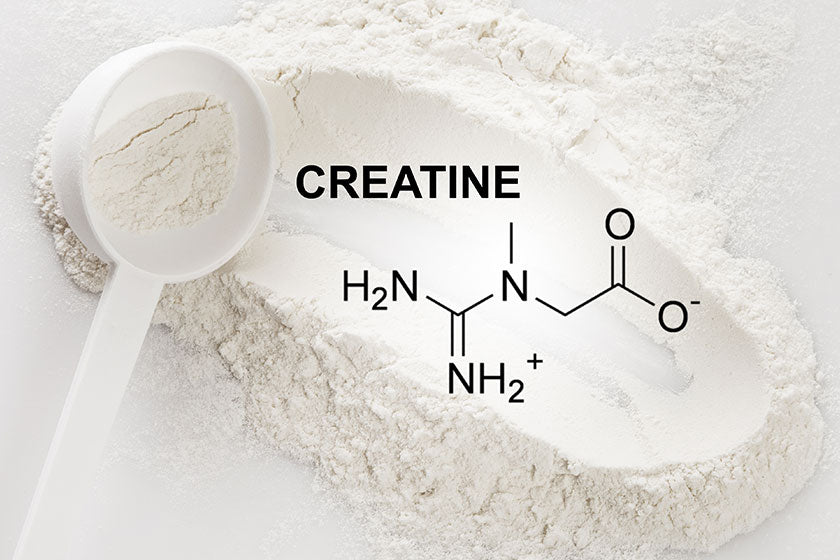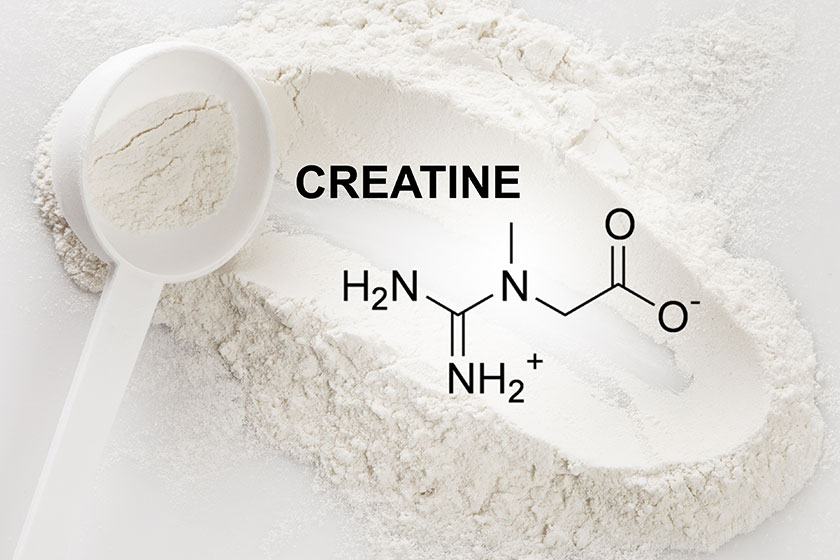
Exploring How Creatine May Alleviate Menopause Symptoms Based on Recent Research
As women approach midlife, the transition into menopause can bring a host of challenging symptoms that impact both physical and mental well-being. While hormone replacement therapy has long been a go-to treatment, recent research has shed light on an unexpected ally in managing menopause symptoms: creatine. This naturally occurring compound, best known for its role in enhancing athletic performance, is now emerging as a potential game-changer for women navigating the complexities of menopause.

Understanding Creatine and Its Role in the Body
Creatine is an organic compound synthesized primarily in the liver, pancreas, and kidneys from amino acids. It plays a pivotal role in energy production, particularly in muscle and brain tissue. The primary function of creatine is to facilitate the recycling of adenosine triphosphate (ATP), the body's primary energy source. It does this by converting adenosine diphosphate (ADP) back to ATP through the donation of phosphate groups.
This process is especially important during brief, intense activities, where up to 80% of ATP can be produced via this creatine-dependent reaction. Approximately 95% of the body's creatine stores are found in skeletal muscle, with the remainder distributed in the blood, brain, and other tissues.
The Menopause Challenge: Common Symptoms and Their Impact
Menopause brings with it a diverse array of symptoms that can significantly impact a woman's quality of life. These symptoms include:
Physical Symptoms:
- Hot flashes and night sweats
- Vaginal dryness
- Muscle and joint pains
- Changes in heart rhythm and palpitations
Mental Health Symptoms:
- Mood swings, anxiety, and low self-esteem
- Cognitive symptoms, often referred to as "brain fog"
Other Symptoms:
- Irregular periods
- Weight gain and changes in body shape
- Skin changes, including dryness and itching
These symptoms can have a profound impact on relationships, work life, and overall well-being. However, recent research suggests creatine supplementation may offer relief for several of these symptoms.
Creatine and Menopause: What the Latest Research Says
Recent studies have highlighted several potential benefits of creatine supplementation for menopausal women, particularly in the areas of muscle and bone health, cognitive function, and mood stability.
Muscle and Bone Health: A study found that older women supplementing with creatine doubled the strength gained from a 10-week resistance training program compared to those not using creatine. Additionally, a 12-month study showed that women experiencing menopause symptoms had a reduced rate of bone mineral density loss in the hip region and an increased femoral shaft width, leading to greater bone bending strength when combining creatine supplementation with resistance training.
Cognitive Function: Research suggests that creatine can enhance cognitive processing, improve memory, and combat age-related cognitive decline. This is particularly relevant for menopausal women who often report issues with memory and concentration.
Mood Stability: Studies have shown that creatine supplements can help treat mood issues faster, with some women experiencing improvements in as little as 4-5 weeks when combined with antidepressant medication.

How Creatine Alleviates Specific Menopause Symptoms
Fatigue and Muscle Strength: Creatine supplementation, particularly when combined with resistance training, can help counteract menopause-related decreases in muscle mass and strength. For postmenopausal women, a loading dose of 20g of creatine per day for 7 days, followed by a maintenance dose of 5g daily, has been shown to improve muscle mass, strength, and physical performance.
Mood Swings: Creatine may help stabilize mood by influencing neurotransmitter levels. Research indicates that creatine supplementation can increase levels of dopamine and serotonin, neurotransmitters involved in mood regulation.
Cognitive Decline: While evidence is still emerging, some studies suggest that creatine can support brain health. It may support a pro-energetic environment in the brain, which could be beneficial for cognitive function, especially in menopausal women who are more susceptible to increased inflammation.

Recommended Dosage and Types of Creatine
For women experiencing menopause symptoms, the recommended dosage of creatine typically involves two phases:
Loading Phase: 20-25 grams of creatine per day, divided into 4-5 doses of 5 grams each, taken for 5-7 days.
Maintenance Phase: 3-5 grams per day to maintain elevated muscle creatine levels.
Creatine monohydrate is the most studied and recommended form, shown to be the most effective in counteracting menopause-related decreases in muscle, bone, and strength.
Safety and Side Effects
Studies have consistently shown that creatine supplementation does not pose a greater risk than a placebo, even in women-specific studies. A two-year randomized controlled trial involving postmenopausal women found no adverse effects from creatine supplementation combined with a resistance training and walking program.
Contrary to some misconceptions, there is no demonstrated significant increase in body mass or water retention due to creatine supplementation in women.
Interactions with Other Supplements and Medications
While creatine is generally safe, it's important to be aware of potential interactions with other supplements or medications commonly used during menopause. Creatine can interact with medications that may affect kidney function, such as certain antibiotics and nonsteroidal anti-inflammatory drugs (NSAIDs). It's always recommended to consult with a healthcare provider before starting creatine supplementation, especially if you're taking other medications.
The Role of Diet and Exercise
Creatine supplementation is most effective when combined with a healthy diet and regular exercise. A balanced diet rich in nutrient-dense foods, including vegetables, fruits, whole grains, lean proteins, and healthy oils, is essential for overall health during menopause. Incorporating phytoestrogens, found in foods like soybeans and certain seeds, can also help alleviate symptoms related to the decline in estrogen levels.
Regular exercise, particularly aerobic, strength, and balance exercises, can significantly improve menopausal symptoms. Weight-bearing and strength-training exercises are particularly beneficial for maintaining bone density and muscle mass, which are critical during menopause when these tend to decline.
Conclusion: A Promising Tool in the Menopause Management Toolkit
As we continue to unravel the complexities of menopause and seek effective management strategies, creatine emerges as a promising addition to the toolkit. Its potential to alleviate symptoms ranging from muscle weakness to mood swings and cognitive decline makes it an intriguing option for women navigating this life transition.
However, it's crucial to remember that while the research is promising, creatine supplementation should be part of a comprehensive approach to menopause management. A balanced diet, regular exercise, and consultation with healthcare providers remain fundamental. As with any supplement, individual responses may vary, and what works for one woman may not work for another.
As ongoing research continues to refine our understanding of creatine's role in menopause management, it stands as a testament to the power of looking beyond traditional approaches and considering innovative solutions to age-old challenges. For women seeking natural ways to support their health during menopause, creatine supplementation may well be worth discussing with their healthcare provider.
What is creatine and how does it work in the body?
Creatine is a naturally occurring compound synthesized in the liver, pancreas, and kidneys from amino acids. It plays a crucial role in energy production, particularly in muscle and brain tissue, by recycling adenosine triphosphate (ATP), the body's primary energy source.
What are common menopause symptoms that women experience?
Common menopause symptoms include hot flashes, night sweats, vaginal dryness, muscle and joint pains, mood swings, anxiety, cognitive issues like 'brain fog', irregular periods, weight gain, and skin changes.
How can creatine help alleviate menopause symptoms?
Recent research suggests that creatine supplementation can improve muscle and bone health, enhance cognitive function, and stabilize mood, potentially alleviating several menopause-related symptoms.
What is the recommended dosage of creatine for menopausal women?
For menopausal women, the recommended dosage typically involves a loading phase of 20-25 grams per day for 5-7 days, followed by a maintenance phase of 3-5 grams daily.
What form of creatine is most effective for managing menopause symptoms?
Creatine monohydrate is the most studied and recommended form, shown to effectively counteract menopause-related decreases in muscle, bone, and strength.
Is creatine supplementation safe for women?
Yes, studies have shown that creatine supplementation is generally safe and does not pose a greater risk than a placebo, even in postmenopausal women.
Can creatine cause weight gain or water retention in women?
Contrary to some misconceptions, creatine supplementation does not significantly increase body mass or cause water retention in women.
Are there any interactions between creatine and other medications?
Creatine may interact with medications that affect kidney function, such as certain antibiotics and NSAIDs. It's always best to consult with a healthcare provider before starting creatine.
How does diet and exercise impact the effectiveness of creatine supplementation?
Creatine supplementation is most effective when combined with a balanced diet rich in nutrient-dense foods and regular exercise, particularly strength training and aerobic activities.
Should creatine supplementation be part of a broader menopause management strategy?
Yes, while creatine shows promise, it should be part of a comprehensive approach to menopause management that includes a balanced diet, regular exercise, and consultation with healthcare providers.
